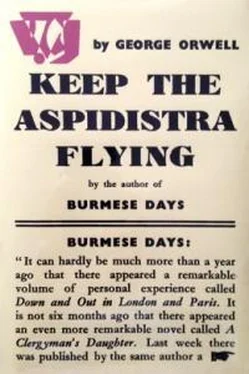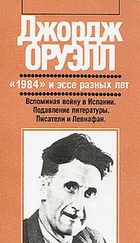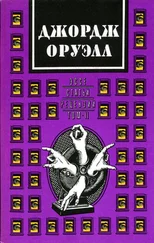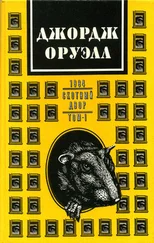So here we are. A mean, dreadful room. Lino on the floor, gas– fire, huge double bed with sheets vaguely dingy. Over the bed a framed coloured picture from La Vie Parisienne. A mistake, that. Sometimes the originals don't compare so well. And, by Jove! on the bamboo table by the window, positively an aspidistra! Hast thou found me, O mine enemy? But come here, Dora. Let's have a look at you.
He seemed to be lying on the bed. He could not see very well. Her youthful, rapacious face, with blackened eyebrows, leaned over him as he sprawled there.
'How about my present?' she demanded, half wheedling, half menacing.
Never mind that now. To work! Come here. Not a bad mouth. Come here. Come closer. Ah!
No. No use. Impossible. The will but not the way. The spirit is willing but the flesh is weak. Try again. No. The booze, it must be. See Macbeth. One last try. No, no use. Not this evening, I'm afraid.
All right, Dora, don't you worry. You'll get your two quid all right. We aren't paying by results.
He made a clumsy gesture. 'Here, give us that bottle. That bottle off the dressing–table.'
Dora brought it. Ah, that's better. That at least doesn't fail. With hands that had swollen to monstrous size he up–ended the Chianti bottle. The wine flowed down his throat, bitter and choking, and some of it went up his nose. It overwhelmed him. He was slipping, sliding, falling off the bed. His head met the floor. His legs were still on the bed. For a while he lay in this position. Is this the way to live? Down below the youthful voices were still mournfully singing:
'For tonight we'll merry be, For tonight we'll merry be, For tonight we'll merry be–e–e— Tomorrow we'll be so–ober!'
And, by Jove, tomorrow we WERE sober!
Gordon emerged from some long, sickly dream to the consciousness that the books in the lending library were the wrong way up. They were all lying on their sides. Moreover, for some reason their backs had turned white—white and shiny, like porcelain.
He opened his eyes a little wider and moved an arm. Small rivulets of pain, seemingly touched off by the movement, shot through his body at unexpected places—down the calves of his legs, for instance, and up both sides of his head. He perceived that he was lying on his side, with a hard smooth pillow under his cheek and a coarse blanket scratching his chin and pushing its hairs into his mouth. Apart from the minor pains that stabbed him every time he moved, there was a large, dull sort of pain which was not localized but which seemed to hover all over him.
Suddenly he flung off the blanket and sat up. He was in a police cell. At this moment a frightful spasm of nausea overcame him. Dimly perceiving a W.C. in the corner, he crept towards it and was violently sick, three or four times.
After that, for several minutes, he was in agonizing pain. He could scarcely stand on his feet, his head throbbed as though it were going to burst, and the light seemed like some scalding white liquid pouring into his brain through the sockets of his eyes. He sat on the bed holding his head between his hands. Presently, when some of the throbbing had died down, he had another look about him. The cell measured about twelve feet long by six wide and was very high. The walls were all of white porcelain bricks, horribly white and clean. He wondered dully how they cleaned as high up as the ceiling. Perhaps with a hose, he reflected. At one end there was a little barred window, very high up, and at the other end, over the door, an electric bulb let into the wall and protected by a stout grating. The thing he was sitting on was not actually a bed, but a shelf with one blanket and a canvas pillow. The door was of steel, painted green. In the door there was a little round hole with a flap on the outside.
Having seen this much he lay down and pulled the blanket over him again. He had no further curiosity about his surroundings. As to what had happened last night, he remembered everything—at least, he remembered everything up to the time when he had gone with Dora into the room with the aspidistra. God knew what had happened after that. There had been some kind of bust–up and he had landed in the clink. He had no notion of what he had done; it might be murder for all he knew. In any case he did not care. He turned his face to the wall and pulled the blanket over his head to shut out the light.
After a long time the spyhole in the door was pushed aside. Gordon managed to turn his head round. His neck–muscles seemed to creak. Through the spyhole he could see a blue eye and a semi–circle of pink chubby cheek.
''Ja do with a cup of tea?' a voice said.
Gordon sat up and instantly felt very sick again. He took his head between his hands and groaned. The thought of a cup of hot tea appealed to him, but he knew it would make him sick if it had sugar in it.
'Please,' he said.
The police constable opened a partition in the top half of the door and passed in a thick white mug of tea. It had sugar in it. The constable was a solid rosy young man of about twenty–five, with a kind face, white eyelashes, and a tremendous chest. It reminded Gordon of the chest of a carthorse. He spoke with a good accent but with vulgar turns of speech. For a minute or so he stood regarding Gordon.
'You weren't half bad last night,' he said finally.
'I'm bad now.'
'You was worse last night, though. What you go and hit the sergeant for?'
'Did I hit the sergeant?'
'Did you? Coo! He wasn't half wild. He turns to me and he says— holding his ear he was, like this—he says, "Now, if that man wasn't too drunk to stand, I'd knock his block off." It's all gone down on your charge sheet. Drunk and disorderly. You'd only ha' bin drunk and incapable if you hadn't of hit the sergeant.'
'Do you know what I shall get for this?'
'Five quid or fourteen days. You'll go up before Mr Groom. Lucky for you it wasn't Mr Walker. He'd give you a month without the option, Mr Walker would. Very severe on the drunks he is. Teetotaller.'
Gordon had drunk some of the tea. It was nauseatingly sweet but its warmth made him feel stronger. He gulped it down. At this moment a nasty, snarling sort of voice—the sergeant whom Gordon had hit, no doubt—yelped from somewhere outside:
'Take that man out and get him washed. Black Maria leaves at half past nine.'
The constable hastened to open the cell door. As soon as Gordon stepped outside he felt worse then ever. This was partly because it was much colder in the passage than in the cell. He walked a step or two, and then suddenly his head was going round and round. 'I'm going to be sick!' he cried. He was falling—he flung out a hand and stopped himself against the wall. The constable's strong arm went round him. Across the arm, as over a rail, Gordon sagged, doubled up and limp. A jet of vomit burst from him. It was the tea, of course. There was a gutter running along the stone floor. At the end of the passage the moustachio'd sergeant, in tunic without a belt, stood with his hand on his hip, looking on disgustedly.
'Dirty little tyke,' he muttered, and turned away.
'Come on, old chap,' said the constable. 'You'll be better in half a mo'.'
He half led, half dragged Gordon to a big stone sink at the end of the passage and helped him to strip to the waist. His gentleness was astonishing. He handled Gordon almost like a nurse handling a child. Gordon had recovered enough strength to sluice himself with the ice–cold water and rinse his mouth out. The constable gave him a torn towel to dry himself with and then led him back to the cell.
'Now you sit quiet till the Black Maria comes. And take my tip— when you go up to the court, you plead guilty and say you won't do it again. Mr Groom won't be hard on you.'
Читать дальше








